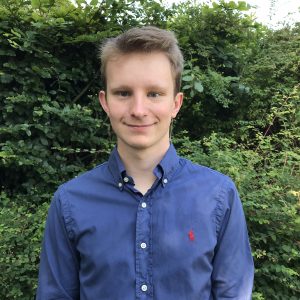
Final year PGR James Capers was awarded a summer student bursary, covering a small stipend and project fees to allow him to host an undergraduate student for 10 weeks to complete a summer research project on ‘New Methods for Designing Elastic Metamaterials’, which took place July-September 2022.
In a competitive process, the PGRs had to put forward a project proposal, which were then reviewed by members of our Management Board. Once the call out had been made to undergraduates, the PGRs reviewed applications and decided who to call to interview before selecting the successful applicant (Felix Yeats-Brown, who was in his third-year of MPhysics degree at the time of taking on the placement).

Felix explains the aim of the project:
The work for this project was focused around elastic metamaterials, specifically the theory that surrounds the Kirchoff-Love plates. We used Python to simulate a steel plate being subjected to elastic plane waves, and designed a program to map the effect of placing scatterers on the plate; an algorithm was then implemented to create desired conditions at a target location, such as lensing or cloaking of the elastic waves.
Below are comments from Felix and James as they reflect back on the achievements and experience of running and participating in the summer student project:
Felix talks about what he has learnt personally from the project:
I think the project has helped me understand what it would mean to be a PhD student, and the level of research and dedication required to complete such a qualification. One of the main reasons I signed up for this project was to find out more about this, and the whole experience has been extremely helpful in that sense. I’m still not sure whether I am cut out for such a thing, but it’s certainly got me thinking!
Another thing the project has helped me with is my proficiency in programming – after a non-stop 7-8 weeks of Python, I feel I am very confident in using it to aid my studies, and is definitely a skill I can take forward into later life (and career). My mathematical skills and logical thinking have been tested frequently over the project, and I’d like to think I’m a better physicist than when I started. Working within the Metamaterials department has also been a great experience; seeing all the other research going on and being surrounded in an environment of critical thinking and problem solving has helped me think on my feet better, and developed my passion for physics further.
James says of the challenges and rewards of running a summer student project:
Running the summer project was a fantastic opportunity for me to learn how to put together a research project from start to finish. Writing an application is not something PhD students normally need to do. While this was a bit of a learning curve, the experience will be useful for whatever career I go onto after the PhD. Experiencing a research project from a supervisor’s perspective was initially a daunting experience. Being completely responsible for making sure a student has everything they need and answering all of their questions as they learn about the project was challenging but rewarding. Answering Felix’s questions definitely made me think carefully about my work and how best to explain how concepts, mathematics and code all connect when you’re trying to generate scientific results. Having a totally new take on my research was refreshing and Felix’s insights and comments will definitely be useful going forwards.